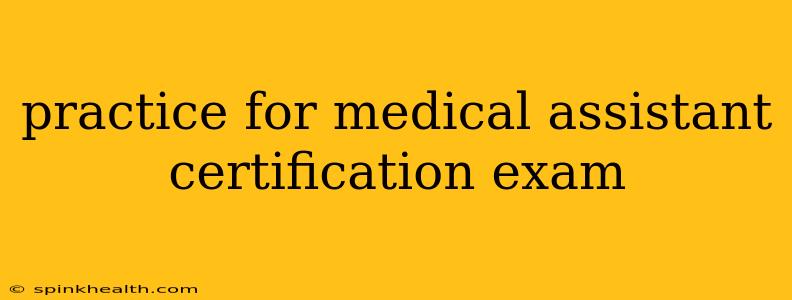The journey to becoming a certified medical assistant (CMA) is a rewarding one, filled with the promise of a fulfilling career in healthcare. But before you can don that crisp, professional uniform and begin your work helping patients, you'll need to conquer the medical assistant certification exam. This isn't just a test; it's a culmination of your hard work, dedication, and acquired knowledge. This post will guide you through effective practice strategies to ensure you're not just ready, but confident on exam day.
Imagine this: you walk into the testing center, a calm confidence radiating from you. You've prepared meticulously, leaving no stone unturned. You approach each question with clarity and precision, knowing you've mastered the material. This isn't a dream; it's a realistic goal achievable with the right preparation strategy. Let's embark on this journey together.
How Long Should I Study for the Medical Assistant Certification Exam?
This is a common question, and the answer depends entirely on your current knowledge base and learning style. Some individuals might need several months of dedicated study, while others with a strong foundation in healthcare might require less time. A general recommendation is to allot at least 8-12 weeks of consistent study. This allows for thorough review of all topics, plenty of practice exams, and time to address any weak areas. Don't rush the process; quality over quantity is key!
What are the Most Important Topics to Study for the Medical Assistant Certification Exam?
The specific topics covered vary slightly depending on the certifying agency (e.g., AAMA, AMT), but some core subjects consistently appear:
- Administrative duties: This includes medical record keeping (both electronic and paper), scheduling appointments, insurance processing and billing, managing patient correspondence, and maintaining the overall efficiency of the medical office.
- Clinical duties: This forms a significant portion of the exam and covers vital signs measurement, phlebotomy (blood collection), electrocardiography (ECG), assisting with minor surgical procedures, administering injections, preparing and sterilizing instruments, and assisting physicians with patient examinations. Understanding medical terminology is absolutely crucial.
- Medical law and ethics: A strong grasp of HIPAA (Health Insurance Portability and Accountability Act) regulations, patient confidentiality, and professional ethics is essential. This section tests your understanding of legal and ethical responsibilities within the medical field.
- Pharmacology: While you won't be prescribing medication, understanding basic pharmacology, drug classifications, and potential side effects is vital for assisting the physician and ensuring patient safety.
What Types of Questions Will Be on the Medical Assistant Certification Exam?
The exam typically features a variety of question types, including:
- Multiple-choice questions: These are the most common type and test your knowledge of facts, concepts, and procedures.
- Matching questions: You will match terms or concepts with their definitions or descriptions.
- Fill-in-the-blank questions: These require you to recall specific information or complete statements.
- True/false questions: These test your knowledge of specific facts.
- Scenario-based questions: These present real-life clinical scenarios and ask you to identify the best course of action. These are crucial and test your ability to apply your knowledge in practice.
What Study Materials Should I Use to Prepare for the Medical Assistant Certification Exam?
Your study materials should be comprehensive and reflect the exam's content. Consider using a combination of:
- Textbooks: A high-quality medical assisting textbook will provide a foundational understanding of all core concepts.
- Practice exams: These are invaluable for identifying your strengths and weaknesses. Take several practice tests under timed conditions to simulate the actual exam environment.
- Online resources: Many websites and online courses offer valuable study materials, quizzes, and practice questions.
- Flashcards: These are excellent for memorizing key terms and concepts.
How Can I Effectively Manage My Time While Studying?
Effective time management is crucial. Create a realistic study schedule that allows for consistent, focused study sessions without burnout. Break down your study material into manageable chunks, focusing on one topic at a time. Regular breaks and sufficient rest are essential for optimal learning. Use a planner or calendar to track your progress and stay organized.
What are Some Effective Study Strategies?
- Active recall: Test yourself frequently without looking at your notes. This strengthens memory and identifies areas needing further review.
- Spaced repetition: Review material at increasing intervals to strengthen long-term retention.
- Teach the material: Explain concepts to someone else to solidify your understanding.
- Practice questions: Work through numerous practice questions to familiarize yourself with the exam format and question types.
How Can I Reduce Test Anxiety?
Test anxiety is common, but manageable. Practice relaxation techniques such as deep breathing or meditation. Get plenty of sleep in the days leading up to the exam. Eat a healthy diet and stay hydrated. Remember, preparation is your best defense against anxiety. Feeling prepared will significantly boost your confidence.
This journey to certification is yours. By employing these strategies, you’ll not only pass the exam, but you'll be well-equipped to thrive in your chosen career. Remember, dedication and consistent effort are your allies on this path. Good luck!

